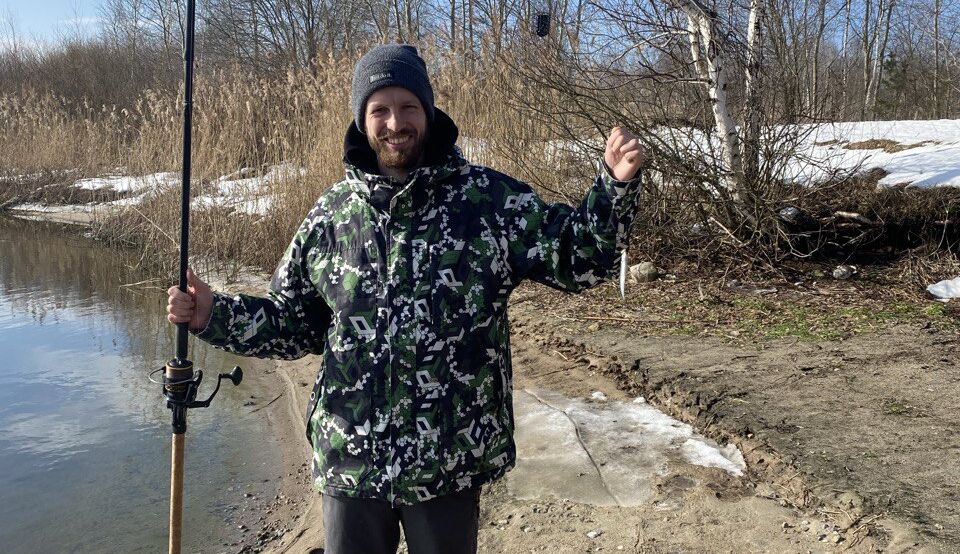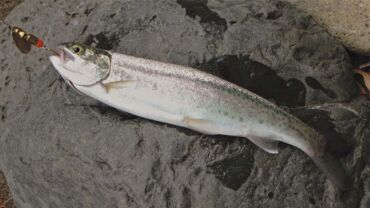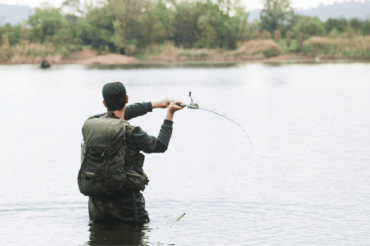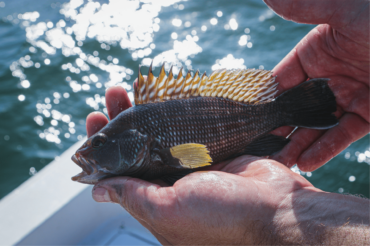As the leaves begin to turn and the cold air starts to hit, fishermen all over will begin to pack up their gear and call it a season. But this change in season doesn’t mean the end for many serious anglers and brings about more opportunities. For those willing to brave the cold, the possibilities are endless.
But to find success in colder weather, you must use the right techniques, gear, and strategies. To help you out, we will dive into the world of cold-weather fishing. Whether you are fishing on frozen lakes or icy rivers, you’ll find what you need to find greater success when out braving the elements.
Expert Opinions on Cold Weather Fishing
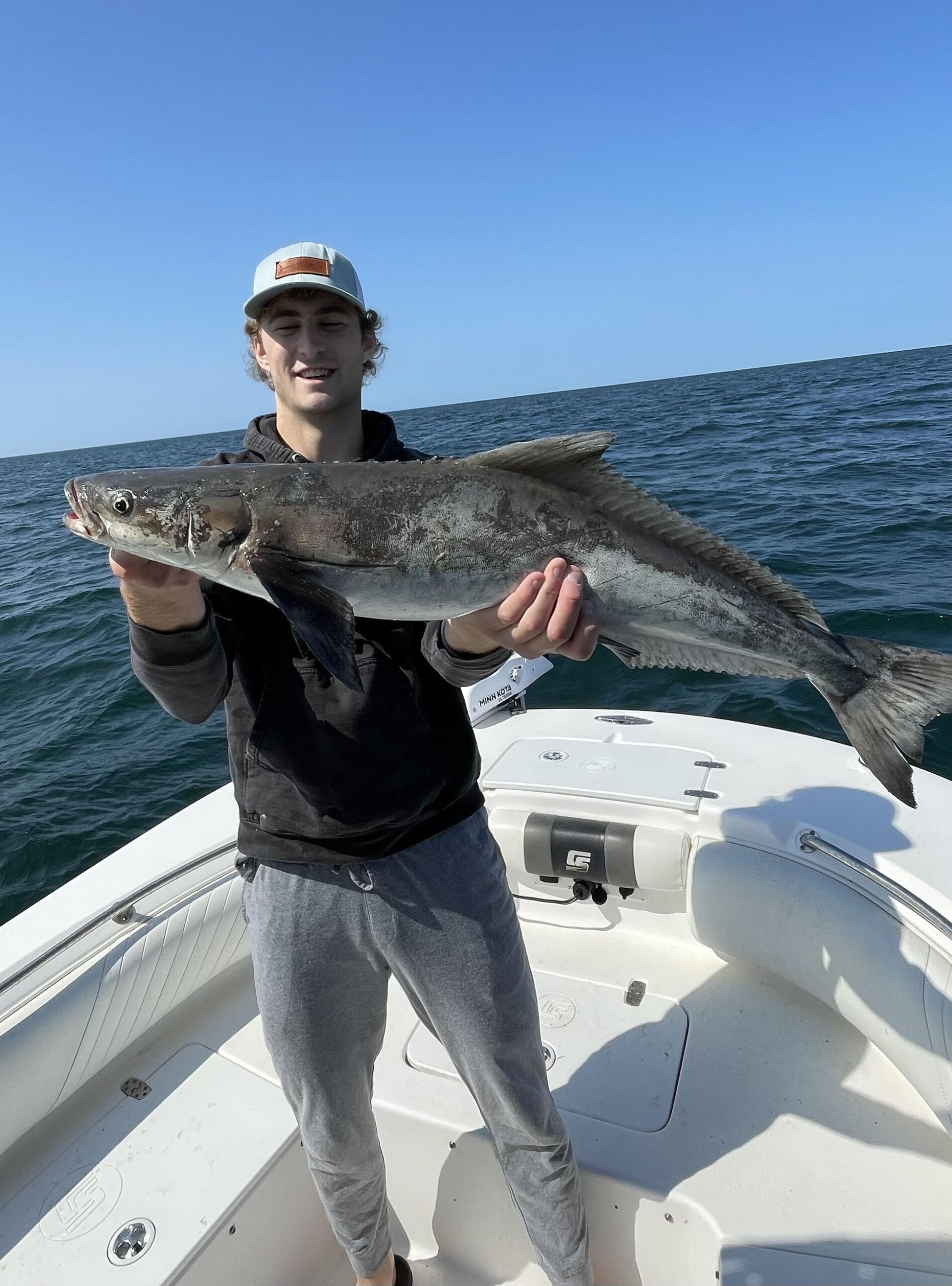
Pierce Latta
16 years fishing experience
“Cold-weather fishing can be a sore topic for a lot of anglers, especially those who aren’t brave enough to get outside and deal with the uncomfortable conditions presented to them. If I’m honest, cold-weather fishing is just not my favorite thing to do. I’d rather be fishing in sunny, 75-degree weather than fishing in cold weather, but like always, winter will eventually come around.
So, while I may enjoy fishing in warmer weather better, I believe the reward of catching a cold-water fish, particularly largemouth bass, is worth me getting outside and freezing my rear end off for a couple hours. Let me break down why I still value cold-weather fishing for bass and some tips and tricks I have regarding the cold weather.
First off, catching a cold-water fish is simply more difficult. You must earn each and every one of your bites. Those fish don’t want to move—their metabolism is extremely slow, and the last thing they want to do is exert effort to bite some bait that flies in front of them. This being said, a colder-water fish is simply harder to come by and thus more special than your typical spring or summer largemouth bass.
Second, you get to switch tactics entirely. Just think, for the past six months you’ve been throwing nothing but fast-paced baits, but now you get to slow it down and bring out an entire new arsenal of cold-water weapons.
Let me just give you three of my favorite cold-water baits to throw. One: the blade bait. Now, when I tell you there is no more fun freshwater bait to throw, I mean it wholeheartedly. That quick pull-up and then that blade bait falling back down to the bottom is like no other. The bass will often hit it in the fall and there is nothing better than hooking a largemouth on a blade bait. One important note, though, just pick a blade bait that will stand out and is shiny. Two: square-bill crankbait. This is just a classic choice to reach those finnicky fish on the bottom that don’t want to move. Retrieve fairly slowly and let the bill of the crankbait do the work for you. Three: the jig. Just bounce that thing on the bottom (trailer is optional) and slowly retrieve. Cast near cover—especially if you have a weed guard—and see if you can’t get yourself one of those winter largemouths.
Lastly, the best part about cold-water fishing is there is almost no pressure on the fish at all compared to other times of the year. Anytime I’m out fishing in the late fall and winter—I’m alone. Not only does this allow for a more peaceful fishing session, but it also offers you a higher chance of getting hooked up as you’re the only one with bait in the water.
So as fall and winter roll around, don’t just shack up for the winter—get your gear ready and go get yourself a winter longy. Good luck and tight lines!”
Visit his Instagram profile.
Subscribe to his YouTube channel.
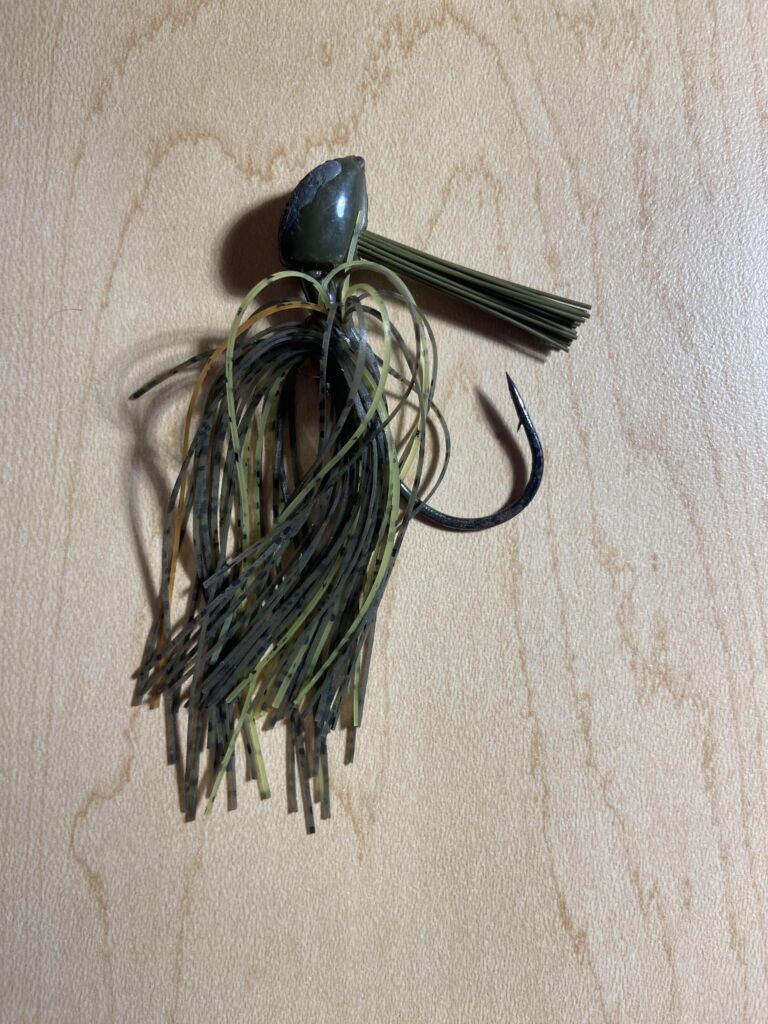
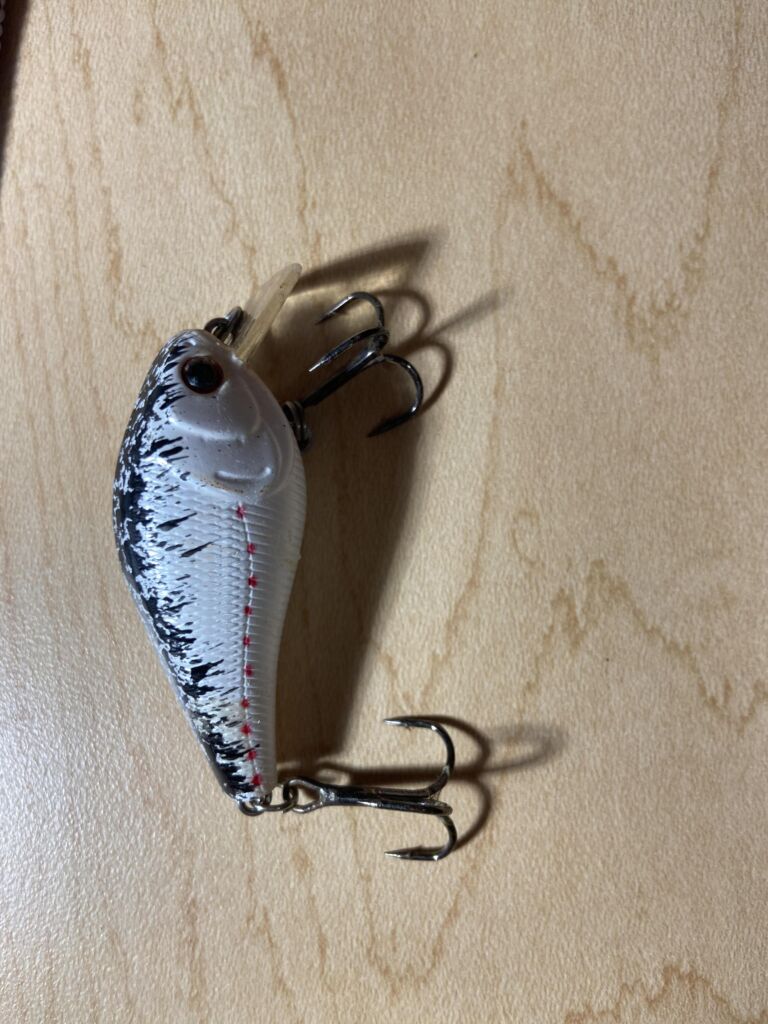
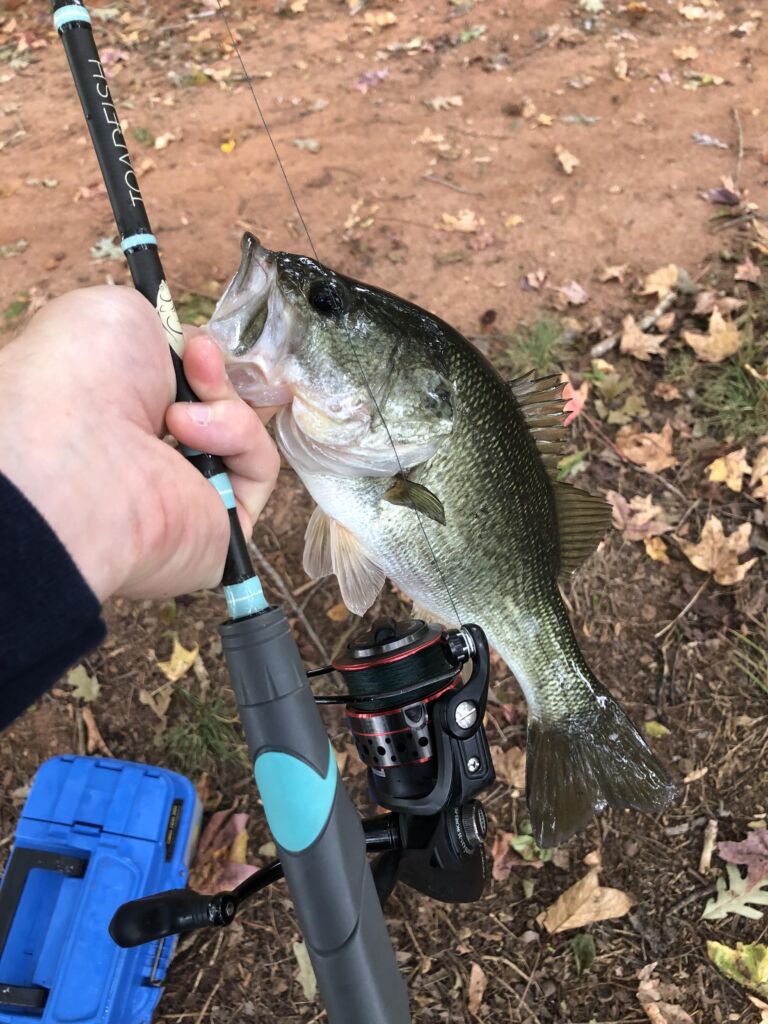
Why Fish Bite in Cold Weather
Before we dive into how to catch fish in colder weather, let’s first figure out why the cold may be better for fishing than warmer weather. While it may seem a little unconventional, fishing in the cold has a few biological advantages. During the winter, fish will slow down their metabolisms and become less active and more focused on conserving energy.
While this may sound like harder circumstances, it means that they can often be easier to find and catch. Most fish species are cold-blooded, which essentially means that they are unable to regulate their body temperature. This also means that they are forced to adjust their metabolisms depending on the water temperatures around them. By knowing how fish respond to the temperatures, you can adjust your tactics accordingly.
Get your personalized fishing map
Answer a quick quiz and get your own personalized fishing map
For example, in cold water, the fish will tend to slow down and eat less food. By contrast, warmer water temperatures will usually result in much more active fish that need more food to survive. Knowing that fish are generally less active in cold weather means you need to fish differently than at other times of the year.
In the winter, fish are very reactive to the slightest changes in the water or the weather. Even a small increase or decrease in water pressure can trigger them, making your lures even more effective. Fish are often more sluggish in cold weather as well due to their slowed metabolism, but the winter months are still an excellent time to wet a line.
Preparing for Fishing in Cold Weather
Fishing in the cold comes with many challenges, especially when it comes to your preparation of tactics and gear. You must choose the right cold-weather equipment, as regular gear may freeze or fail to work in low temperatures. For example, many anglers opt to use lines that are less prone to ice and use baits that perform better in cold water. Here are a few important tips for fishing in the colder weather:
Choose the Right Materials
Even your clothing choices are critical in cold weather. Bring along plenty of layers to stay warm, and take care to use moisture-wicking base layers to stay as dry as possible. On top of your base layers, you will want to add some insulation layers topped with a waterproof outer layer that will protect against wind and moisture.
Wool is a popular choice amongst cold-weather anglers as it has an excellent ability to regulate temperature, even when wet. It does a great job of wicking away moisture from your skin as well as keeping you warm. Avoid materials such as cotton, however, as it retains moisture and will keep you cold.
Protect the Extremities
Your hands, feet, ears, and nose are the most susceptible to the cold, so you have to do your best to protect them from the cold. This makes extra clothing items such as thick socks, warm gloves, and face masks even more valuable. Cover as much of your skin as you can to avoid exposure and you should stay much more warm and comfortable as you fish. And if you don’t, you run the risk of overexposure which can lead to things like hypothermia or frostbite if you aren’t careful.
Fish During the Right Times of Day
The good thing about fishing during the winter is that you don’t have to cast a line at the crack of dawn. The best time to fish during these months is anywhere from 10 am to 4 pm which tends to be the warmest part of the day. You can also attempt to fish before cold fronts as fish love to feed before they pass. If you can time it right and be out on a lake or river just before a cold front hits, you will be much more likely to find some success.
Keep the Hands and Feet Warm
As we mentioned earlier, your hands and feet are among the first things to get cold. A quality pair of gloves and boots will go a long way in helping to stay warm. You can also bring along some hand and feet warmers, as these will help knock off a chill and allow you to fish for longer periods without noticing the temperatures.
Wear Plenty of Layers
One of the best ways to fight the cold is by dressing in multiple layers. Place these layers of clothing on your body so that they cover your core and help keep you warm and dry. With many different layers, you can put on or take off layers depending on the weather or your comfort level throughout the day.
By layering your clothing, you will be able to stay warm and comfortable while fishing. You will also stay safe, which is another important consideration in the cold. Insulated boots and gloves will help keep hands and feet warm while a beanie or warm hat will keep you from losing too much body heat. Don’t forget your life jacket and a reliable form of communication.
Lastly, don’t skimp on plenty of water and food. In the cold, it is often easy to go for long periods without drinking. Force yourself to sip on water throughout the day no matter what the temperature is, and maintain your energy levels with plenty of calories. Armed with the right gear, the proper precautions, and plenty of fuel, you can ensure you can focus on the task at hand of fishing and not on the cold.
Techniques for Fishing in Cold Weather
Now onto the fun part: the best tips and techniques for fishing in the cold. There are many different methods for fishing during the winter, ranging from ice fishing to exploring the shore or the water from kayaks, boats, etc. Each one is different and the method that you choose to use will depend on the specific conditions and personal preferences. Each will require its own set of tools and gear as well. For example, ice fishing will need some kind of auger and portable shelter, while fishing from the shore on an icy river may only require some small jigs or live bait. Kayak or boat fishing, on the other hand, will require some open water and a form of transportation.
Pair your rods and reels with the method you choose to find better success. When fishing from shore, longer rods can help land bait or a lure in hard-to-reach areas at a distance. Fishing from a kayak or ice house, however, will be better suited for shorter rods. Match your reel to your rod and the conditions, with braided or fluorocarbon as the usual pick as they can resist cold temperatures. By taking the time to choose the right fishing method and pairing it with the right gear and techniques, you’ll increase your odds of catching that next big fish!
It’s also critical to use specific lures or baits that are designed for the type of fish that you are targeting. This will also play into your casting techniques and retrieves. When fishing in the cold, slow and steady retrieves are often the best due to fish being less active. All of your gear will come into play during the winter, so choose wisely. They could mean the difference between catching fish or going home empty-handed.
Best Lures and Baits
One of the most important aspects of a successful cold-weather fishing trip is using the right lure or bait. In the cold, fish will be much more picky about what they choose to pursue and eat so choosing the right option is vital. Your best bet is to use natural and lifelike imitations of existing food sources in the area. Soft plastics that closely resemble small fish or insects can do extremely well in these conditions. The speed and pace of how you move and retrieve them are also important and should be thought about. Don’t go too fast, as the fish will be less likely to chase your lure.
When it comes to bait, your best options are the tried and true staples such as worms, minnows, or nightcrawlers. Choosing smaller baits among these can also be beneficial. At the end of the day, it all comes down to what fish you are targeting. For example, an angler after catfish will do well with live baits such as sunfish, chubs, or minnows. Cut bait from leftover chub or sunfish can also do well.
Get your personalized fishing map
Answer a quick quiz and get your own personalized fishing map
Other fish like walleye can be best caught with artificial lures like spoons, crankbaits, and jigs. Fish like trout can be caught using either live bait or artificial lures, so it’s a good idea to do your homework on the species you are after. Here are some of the most popular species and the ideal baits and lures to use in the winter:
Largemouth Bass
Largemouth bass can be effectively caught during the winter with things like squarebill crankbaits, spinnerbaits, small jigs, jerkbaits, and flat-sided crankbaits. All of these lures do an excellent job of imitating the erratic movements of baitfish that largemouth love and all of them can be fished with at a variety of depths.
Channel Catfish
Channel catfish, among other species of catfish, love things such as cut bait, chicken livers, and nightcrawlers. All of these have strong scents that will attract catfish, even in the cold water. The smellier the bait, the better when it comes to catfish.
Read also: The Ultimate Guide: Best Time to Catch Catfish Revealed
Smallmouth Bass
Smallmouth bass are very similar to largemouth bass, and many of the same lures work well here but try downsizing a little. Try using jerkbaits, spinnerbaits, blade baits, small jigs, and drop shot rigs. These all work at varying depths and do well to attract smallmouth bass.
Bluegill
For bluegill, some of the most effective baits during the winter months include things such as small jigs, waxworms, nightcrawlers, and mealworms. All of these are small and provide bluegill with a quick and easy meal or resemble insects and their larvae so they can be extremely effective.
Black Crappie
Crappies are a lot of fun to catch in the winter, and the best baits and lures include jigging spoons, jig-and-pigs or craws, small crankbaits, and finesse plastic baits. All of these imitate the movements and appearance of baitfish that will drive crappie crazy.
Blue Catfish
Similar to channel catfish, blue catfish love stinky baits. Use the same things such as cut baits from baitfish, chicken liver, or nightcrawlers. All of these will have strong scents that carry long distances in the water to attract blue catfish.
Rainbow Trout
Trout can be caught on a mix of live bait or lures in the winter. Some favorites include jerkbaits, blade baits, small jigs, nightcrawlers, or drop shot rigs. Trout are an excellent fish species to target during the winter, and rainbow trout are especially fun to catch this time of year.
Walleye
Walleyes are among the most popular ice fishing species, and the best lures and baits include jigging spoons, crankbaits, finesse plastic baits, or even nightcrawlers. All of these appeal to walleye and can make for a fun and exciting day on the ice when fishing.
White Crappie
White crappie is similar to black crappie and loves the same jigging spoons, crankbaits, finesse baits, and jigs that are smaller in size. Use these lures to imitate small baitfish or insects and you will no doubt catch plenty of fish regardless of the weather.
Red Drum
When it comes to red drums, try sticking to things like jerkbaits, blade baits, small jigs, and drop shots. All of these will help entice the drum to bite. The key is to imitate baitfish and their movements that they prefer eating.
Don’t be afraid of experimenting with other types of lures or baits if what you are using is not working. Bring along plenty of different baits with different color variations and sizes to test out what’s working. Every day might be different so don’t give up. The right lures or bait, combined with your patience and technique, can result in your best fishing experiences yet.
Safety On the Ice and in the Cold
One last note, don’t forget to take safety seriously before fishing in the cold. Fishing in the winter carries a few more risks so it requires a few more precautions. Take ice fishing for example. It is extremely important to understand the ice thickness and quality, as being out on ice can be dangerous in certain situations. Checking the ice thickness and remaining cautious should be kept at the front of mind this time of year.
Bring Safety Gear and Equipment
Fishing in the cold weather can be dangerous if you aren’t careful. Bring extra gear for emergencies like a first aid kit and a life vest in case you are fishing around deep water. Should you fall off your boat or break a layer of thin ice, all of your layers of clothing can quickly drag you down in the water so something as simple as a life vest or ring can save your life.
Along with the ice, the cold can be a real threat as well. Bring along all of the warm clothing and gear that we mentioned earlier to avoid hypothermia and frostbite. It’s also a great idea to bring along a spare set of warm clothes just in case you do get wet. For maximum safety, bring along a companion so that you can always have someone to watch your back. Plus, it’s a lot more fun with a friend!
Using the Fishbox App to Maximize Cold Weather Opportunities
The Fishbox app can be a great tool for making the most out of your cold-weather fishing adventures. The app offers a wide range of features to help predict when the fish will be most active, even during the dead of winter. Use it to check up-to-date weather data and forecasts, as well as monitor the barometric patterns to make informed decisions on your next trip!
Final Thoughts
If you’ve made it this far, thanks for joining us! Cold-weather fishing can be some of the best fishing of your life if you are willing to take on the unique set of challenges that it brings. We hope that you are now armed with some of the right knowledge to conquer these trials, and with the Fishbox app at your side, can find great success out on the water, even in the coldest conditions!
